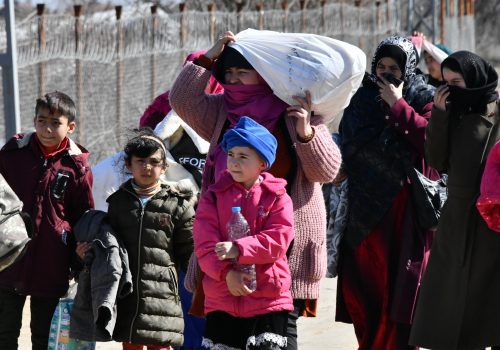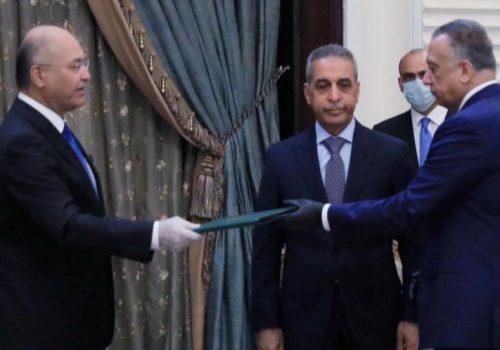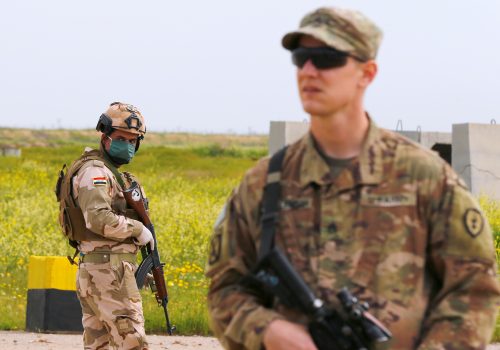Iraq’s government needs more female voices to fight the pandemic
Iraq is in a precarious condition. It has faced major challenges on multiple fronts, including political instability, a drop in oil prices, and the economic fallout amid the coronavirus outbreak. While the government deliberates protection measures, the capacity of hospitals and staff remain limited. The rampant spread of the virus, with an average of 3,000 daily infections, has only been exacerbated by a lack of concrete emergency plans. Up to mid-August, Iraq had 150,000 cases and 5,400 deaths.
One aspect that has been largely ignored during the COVID-19 outbreak is the plight of Iraqi women. Preventative measures against the virus have negatively affected Iraqi women, threatening years of advances in access to education, mobility, healthcare, financial support, and decision-making.
Around the world, the pandemic has caused an increase in domestic violence, including in Arab countries like Iraq. The United Nations Population Fund released a report in March testifying that pandemics increase gender-based violence. The exposure of abusive behavior is more predictable when a family is under lockdown and this has forced many women to remain at home with their abusers. Both the Iraqi government and the Kurdistan Regional Government (KRG) have separately put in place preventive measures in order to limit the coronavirus spread, but lack input on preventing gender-based violence and coordination. In March, with the gradual spread of the virus, the KRG rapidly imposed a month-long lockdown, similar to the Iraqi government’s imposing of multiple lockdowns . With this in mind, gender-based violence is a risk for many across Iraq and requires serious attention.
According to Suzan Arif, head of the Women Empowerment Organization, the Iraqi government, even prior to the pandemic, lacked a large-scale emergency response that deals with domestic violence. In addition, coping with COVID-19 has also affected nongovernmental organizations’ (NGO) ability to deliver their services to manage gender-based violence. As communications are conducted through electronic devices and online methods, there is an associated cost for many Iraqis who do not have access to technologies like the internet or even a cell phone. Still, the free 119 helpline for domestic abuse reported a call decrease during the lockdown, according to Iraqi civil society organizations. Many victims lack privacy and fear being caught on the phone by their male relatives. Similarly, organizations with social media accounts, such as Peace and Development organization, saw victims sometimes deleting their messages after the initial post, fearing reprisal from their abusers.
Interestingly, NGOs are also facing difficulties with online case management according to Behar Munzir, the head of the Peace and Development Organization. Case managers and social workers demand capacity building in order to adapt to receiving and dealing with cases online. Mental health and social support, a critical part of the response, have come under serious strain as well. Munzir said that lifesaving services have been affected too. For example, in the beginning of the lockdown, shelters in the Kurdistan region of Iraq accepted sensitive cases conditionally fearing drawing crowds in the shelters, thus imposing preventive measures on those most at risk whom escaped their families to find second homes should have been treated differently.
Domestic violence during the lockdown isn’t the only problem plaguing Iraqi women. After years of striving for equal participation in all facets of life and contributing to Iraq’s socio-economic development, women are under threat of losing much of these gains because they are forced to stay at home due to the virus. Iraqi women, who contributed to their household by working a job or several jobs, find themselves back in their traditional role of housewife and are expected to prioritize taking care of their family.
Another issue is the role of women in the Iraqi healthcare system. Iraqi Prime Minister Mustafa al-Kadhimi admitted that Iraq does not have a viable health system. With the rising cases of coronavirus since May, there has been reduced access to medical facilities across the country. Most hospitals are dedicated to COVID-19 cases, limiting capacity to receive other types patients. Female doctors play a critical role alongside their male colleagues. However, they lack support and occasionally receive threats from patients’ families out of fear of not conducting their work properly. Some families remain reluctant to even allow their female family members to face such harsh conditions. A female doctor from Basra told me that her father barred her from working before hashing out a solution to continue her work duties. There are also concerns regarding quarantining women who carry the virus, as some families refuse to let female members remain in quarantine unaccompanied due to religious or cultural beliefs.
These issues are largely being ignored due to limited female representation in the Iraqi and KRG governments, as it is still not common to give decision-making positions to women. It’s worth noting, however, that even before the pandemic, community decisions lacked women’s participation and most of the decision-making bodies were made up of men. According to the Women in Parliament report in 2019, Iraq ranks sixty-seventh out of 192 countries in giving a high proportion of seats to women. When it comes to decision-making and cabinet positions, there is an even larger gender deficit and women’s participation is very limited.
Women’s political presence in Iraq still remains a challenge structurally and culturally with barriers in equal participation. As a result, the few female representatives that do exist have had little to no say in gender-sensitive concerns. A recent study by Oxfam in June shows that half of the women that were surveyed in Kirkuk have stated that they were not involved in discussions regarding coronavirus-related decision-making. Prioritizing women’s participation can positively influence the implementation of prevention plans, as their insights will have gender-sensitive methodologies that consider women’s needs. Involving civil society and women’s rights NGOs is an indispensable safeguard to their equal representation and satisfaction of their needs.
It’s worth mentioning that, for their part, Iraqi media outlets and prominent social media accounts have not been constructive in spreading awareness regarding the gender sensitive obstacles that have come with the pandemic. The ultimate focus of media outlets has remained on preventive measures, the spread of COVID-19, the economic crisis, and political announcements. Gender sensitive issues, healthcare barriers with dedicating the majority of hospitals in Iraq to COVID-19 response, and access to education are not familiar areas of discussion on Iraqi TV channels. A palpable sense of what women go through and face amid the coronavirus crisis should be included in media programs. This is an opportunity to be inclusive, to give a limelight to women’s voices across Iraqi media, to welcome their perspectives, their concerns, and meet their needs.
If such opportunities are not met, the repercussions will have grave ramifications for the future of Iraqi women. Since it’s unclear how long the coronavirus pandemic will last, gender sensitivity and women’s voices need to be introduced in all decision-making processes and heard across Iraqi communities. Otherwise, the gains women activists have fought for in recent decades will eventually be erased.
Hanar Marouf is a PhD candidate in politics and international relations, and a Millennium Leadership Fellow at the Atlantic Council.
Image: Women wearing protective face masks, following an outbreak of coronavirus, chant slogans as they protest during the International Women's Day in Baghdad, Iraq, March 8, 2020. REUTERS/Thaier Al-Sudani


